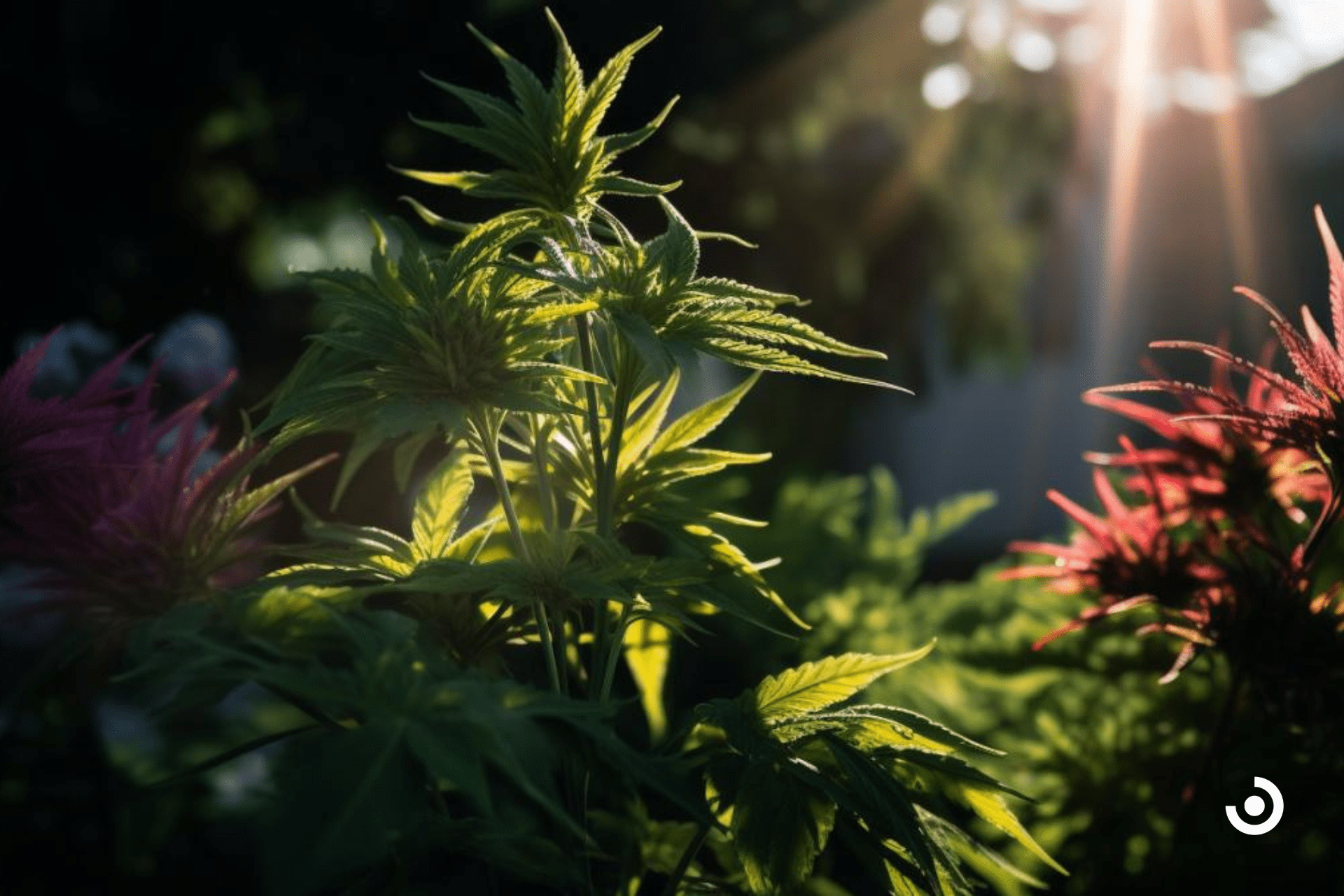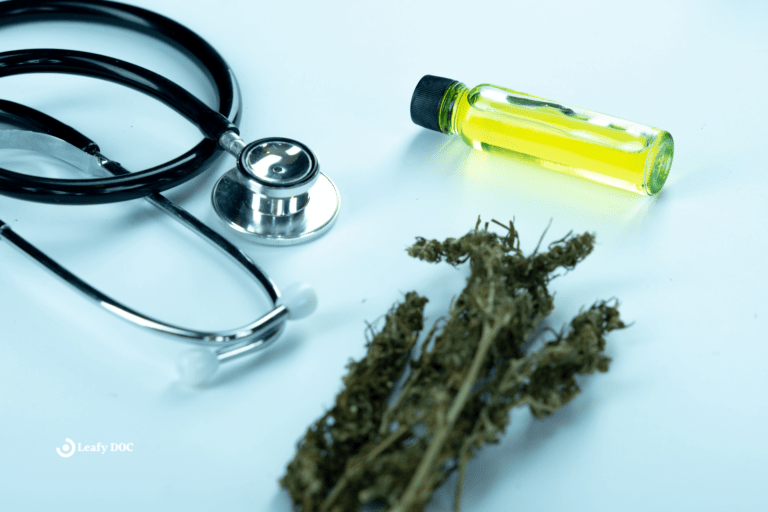Exploring THC Vs CBD For Cancer Treatment
by Tayyaba Amir · February 28, 2024
Uncover the groundbreaking potential of THC and CBD for cancer treatment. Learn how these natural compounds are revolutionizing the fight against cancer. Click here to explore THC vs CBD for cancer and discover a new path to healing.

Are you curious about the potential of THC and CBD in cancer treatment? In this article, we will delve into the fascinating world of these two compounds and explore their respective roles in fighting cancer.
Whether you are a cancer patient, a loved one wanting to support someone in their battle against cancer, or simply someone with a subconscious desire to serve others, understanding the potential benefits and side effects of THC and CBD can provide valuable insights into alternative treatment options.
First, let’s break down THC and CBD. THC, or tetrahydrocannabinol, is the psychoactive compound found in cannabis that gives you that “high” feeling. On the other hand, CBD, or cannabidiol, is a non-psychoactive compound also found in cannabis, known for its potential therapeutic properties. While THC and CBD are both derived from the same plant, they have different effects on the body and interact with the endocannabinoid system in unique ways.
Now, let’s explore the role of THC in cancer treatment. Studies have shown that THC can potentially help alleviate symptoms such as pain, nausea, and vomiting, commonly associated with cancer and its treatments. Additionally, THC has been found to have anti-tumor properties, meaning it may play a role in inhibiting the growth and spread of cancer cells. However, it’s important to note that THC may also have psychoactive side effects, which can vary from person to person.
On the other hand, CBD has gained attention for its potential anti-cancer properties. While research is still ongoing, studies have suggested that CBD may help inhibit the growth of cancer cells and promote programmed cell death, known as apoptosis. CBD has also been found to have anti-inflammatory properties, which can be beneficial for cancer patients dealing with inflammation and related symptoms. Additionally, CBD is generally well-tolerated and does not produce the psychoactive effects associated with THC.
In the next section, we will delve deeper into the potential benefits and side effects of THC and CBD in cancer treatment. Stay tuned to discover how these compounds can be combined for enhanced cancer treatment and what the future holds for this exciting field.
Key Takeaways
- THC and CBD can provide pain relief for cancer patients.
- Both THC and CBD can help reduce nausea and vomiting caused by chemotherapy.
- THC can promote sleep, while CBD can regulate sleep-wake cycles in cancer patients.
- Both THC and CBD can help reduce anxiety and depression in cancer patients and provide a holistic approach to cancer care.
Understanding THC and CBD
THC, also known as the “high” component of cannabis, and CBD, the non-intoxicating compound, both show potential for cancer treatment. When it comes to understanding THC and CBD, it’s important to know that they interact with the body in different ways.
THC binds to the cannabinoid receptors in the brain and central nervous system, resulting in the psychoactive effects commonly associated with marijuana. On the other hand, CBD does not bind directly to these receptors but instead interacts with other receptors in the body, such as the serotonin and vanilloid receptors. This is why CBD does not produce the same “high” as THC.
In terms of cancer treatment, both THC and CBD have been found to have anti-tumor properties. Studies have shown that THC can induce apoptosis, or programmed cell death, in cancer cells. It can also inhibit the growth and spread of tumors.
CBD, on the other hand, has been found to have anti-inflammatory and anti-angiogenic effects, meaning it can reduce inflammation and prevent the formation of new blood vessels that tumors need to grow. Additionally, CBD has also been shown to enhance the effectiveness of chemotherapy drugs, making them more potent against cancer cells.
The Role of THC in Cancer Treatment
One significant aspect of utilizing THC as a potential treatment for cancer is its ability to target cancer cells specifically. Unlike traditional cancer treatments that often have damaging effects on healthy cells as well, THC has shown promise in selectively attacking cancerous cells while leaving healthy cells unharmed. This targeted approach is essential in minimizing the side effects typically associated with cancer treatments, such as chemotherapy.
By specifically targeting cancer cells, THC has the potential to not only eradicate tumors but also prevent their growth and spread. This is important for individuals battling cancer, as it offers hope for a more effective and less invasive treatment option. Additionally, the ability of THC to target cancer cells opens up possibilities for personalized medicine, where treatment plans can be tailored to each patient’s unique needs and circumstances.
The Role of CBD in Cancer Treatment
CBD has shown potential in supporting cancer treatment through its anti-inflammatory and anti-tumor properties. By interacting with the endocannabinoid system in your body, CBD can help reduce inflammation, which is a common symptom of cancer. This can provide relief from pain and discomfort, making your journey through cancer treatment a little more bearable.
In addition to its anti-inflammatory properties, CBD has also been found to have anti-tumor effects. It can inhibit the growth and spread of cancer cells, potentially slowing down the progression of the disease. This means that CBD could be a valuable addition to your treatment plan, working alongside other therapies to give you the best chance at fighting cancer.
As you navigate through your cancer treatment, it’s important to consider all possible options for support. CBD has shown promise in its ability to reduce inflammation and inhibit the growth of cancer cells, making it a potential ally in your fight against cancer.
Potential Benefits and Side Effects of THC and CBD
These two compounds have the potential to offer a range of benefits for cancer patients, from pain relief to reducing nausea and vomiting caused by chemotherapy. THC, the psychoactive component of cannabis, has long been known for its ability to alleviate pain and stimulate appetite. It can provide much-needed relief for cancer patients who are struggling with the side effects of their treatment.
CBD, on the other hand, is non-psychoactive and has been shown to have anti-inflammatory and anti-anxiety properties. It can help reduce inflammation in the body and promote a sense of calm and relaxation. Together, THC and CBD can work in harmony to provide a holistic approach to cancer treatment.
While THC and CBD offer many potential benefits, it’s important to be aware of the possible side effects. THC, being psychoactive, can cause feelings of euphoria and impair cognitive function. This can be problematic for some patients who need to remain alert and focused during their treatment. Additionally, THC can also increase heart rate and blood pressure, which may be a concern for individuals with cardiovascular issues.
CBD, on the other hand, is generally well-tolerated and has few side effects. However, some individuals may experience mild symptoms such as dry mouth, drowsiness, or changes in appetite. It’s important to consult with a healthcare professional to determine the appropriate dosage and to monitor for any potential interactions with other medications.
Combining THC and CBD for Enhanced Cancer Treatment
Combining THC and CBD together can create a powerful synergy that enhances the effectiveness of cancer treatment. When these two compounds are used in combination, they can work together to target cancer cells and inhibit their growth. This means that the treatment can be more effective in killing cancer cells and preventing their spread throughout the body.
In addition to their anti-cancer properties, THC and CBD also offer other benefits that can support the overall well-being of cancer patients. Here are four reasons why combining THC and CBD can be beneficial for cancer treatment:
- Pain relief: THC and CBD are both known for their pain-relieving properties. Cancer patients often experience intense pain as a result of their condition or the side effects of treatment. By combining THC and CBD, patients can experience greater pain relief, allowing them to manage their discomfort and improve their quality of life.
- Reduced nausea and vomiting: Chemotherapy can cause severe nausea and vomiting, which can be debilitating for cancer patients. Both THC and CBD have been shown to help alleviate these symptoms, and when used together, they can provide even greater relief. This can enable patients to tolerate their treatment better and maintain a healthy appetite.
- Improved sleep: Many cancer patients struggle with insomnia and disrupted sleep patterns. THC has been found to promote sleep, while CBD can help regulate sleep-wake cycles. When used in combination, these compounds can help cancer patients achieve better sleep, allowing their bodies to heal and recover more effectively.
- Reduced anxiety and depression: Cancer diagnosis and treatment can take a toll on the mental health of patients, leading to anxiety and depression. Both THC and CBD have been shown to have calming and mood-enhancing effects, and combining them can provide a more comprehensive relief for these emotional symptoms. This can help cancer patients maintain a positive mindset and improve their overall well-being.
By combining THC and CBD, cancer patients can experience enhanced cancer treatment while also benefiting from the multitude of other therapeutic effects these compounds offer. This approach allows for a more holistic and comprehensive approach to cancer care, addressing both the physical and emotional needs of the patients.
Frequently Asked Questions
Can THC or CBD completely cure cancer?
While THC and CBD have shown potential in cancer treatment, it is important to note that they cannot completely cure cancer on their own. However, there have been cases where patients experienced remission or improved quality of life when using these compounds alongside conventional treatments.
Are there any long-term side effects of using THC or CBD for cancer treatment?
Using THC or CBD for cancer treatment may have potential side effects, such as fatigue, nausea, or changes in appetite. It’s important to consult with your healthcare provider to understand the long-term effects and determine the best course of action.
How do the effects of THC and CBD differ when used for cancer treatment?
When used for cancer treatment, THC and CBD have different effects. THC can help with pain and nausea, while CBD may have anti-tumor properties. It’s important to consult with a healthcare professional for personalized advice.
Are there any risks or complications associated with combining THC and CBD for cancer treatment?
Combining THC and CBD for cancer treatment may have some risks and complications. These can include potential side effects like dizziness and fatigue, as well as drug interactions with other medications. It’s important to consult with a healthcare professional before starting any treatment.
Are there any legal restrictions or regulations on using THC or CBD for cancer treatment?
Legal restrictions and regulations on using THC or CBD for cancer treatment vary depending on your location. It’s important to research and consult with medical professionals to ensure compliance and safety.
Last Updated: August 8, 2024
Get Approved for Your Medical Marijuana Card in Minutes!

Get Your Medical Card
Connect with a licensed physician online in minutes

Like This Article?
Share with your friends
Table of Contents
Keep Reading
-
Medical Marijuana and Addiction: Fact vs. Fiction
Explore the relationship between medical marijuana and addiction and separate fact from fiction. Learn about the potential benefits and drawbacks of using cannabis for addiction treatment.
-
Explore The Most Popular Medical Marijuana Products
Discover the most popular cannabis products on the market, including CBD oils and edibles. Explore natural and effective options for wellness. Click now to find your perfect choice!
-
Managing Sleep Disruption As A Side Effect Of Medical Marijuana
Struggling with sleep disruption from medical marijuana? Find out how to regain a peaceful night’s rest and optimize your cannabis journey. Click here for essential tips and tricks!



